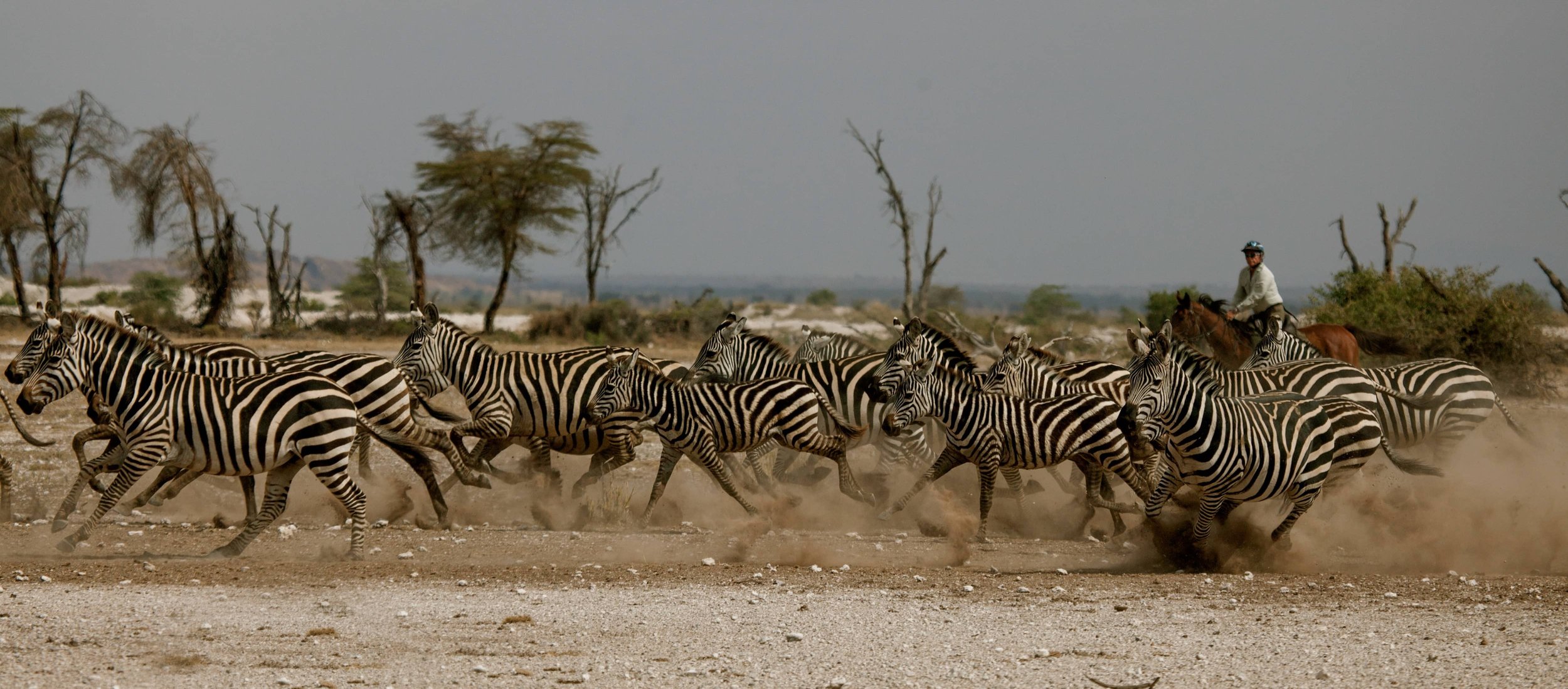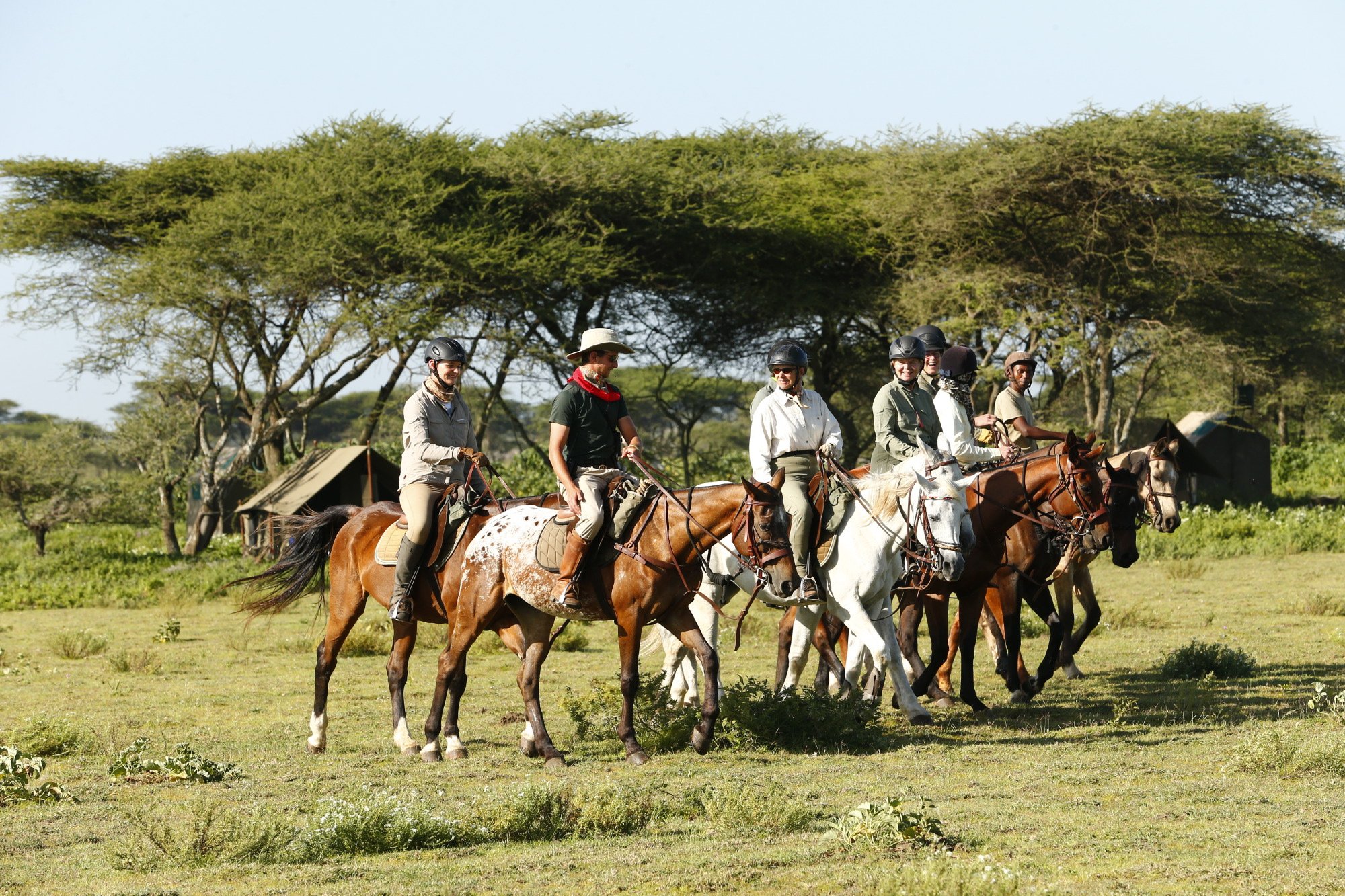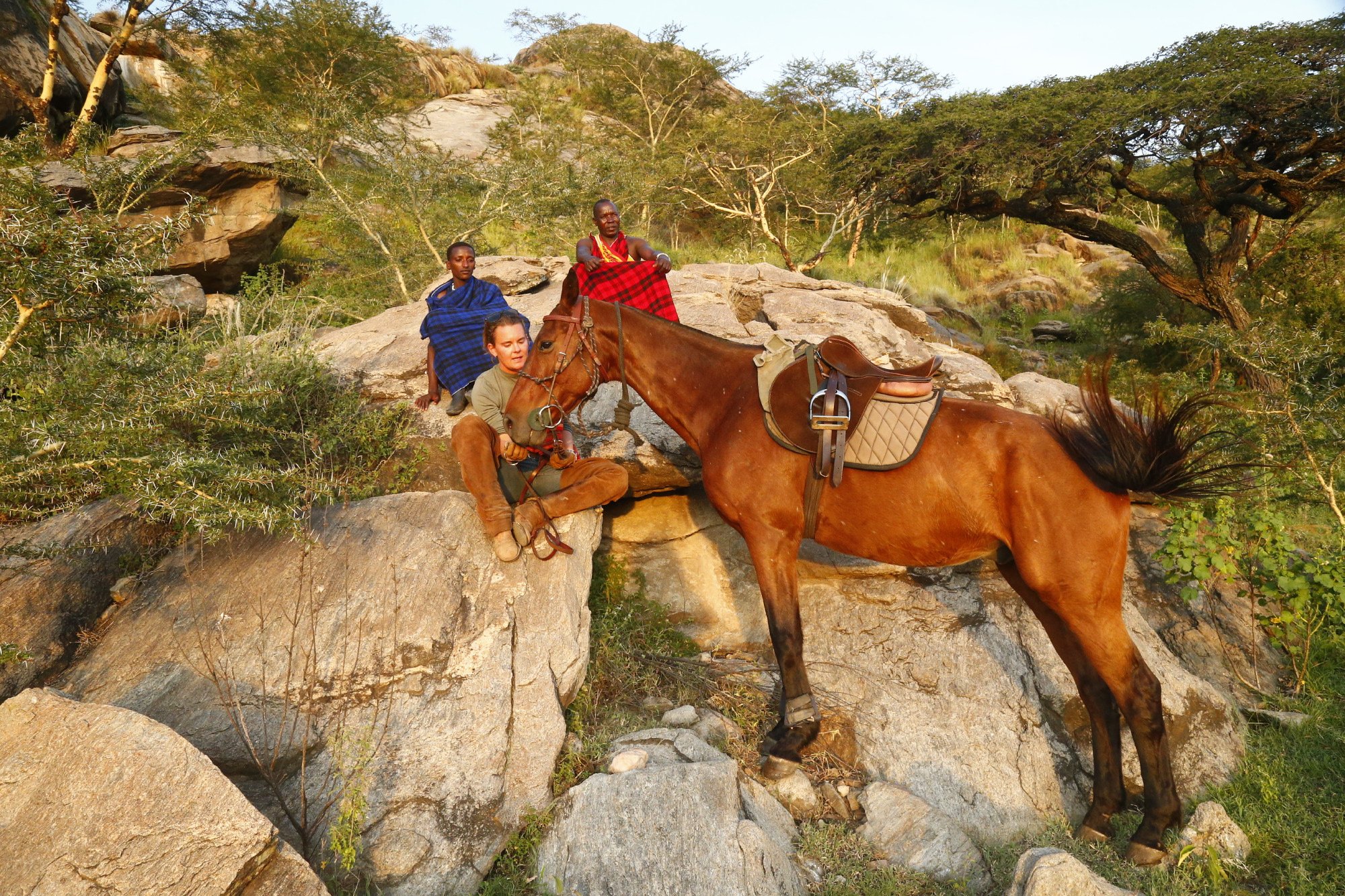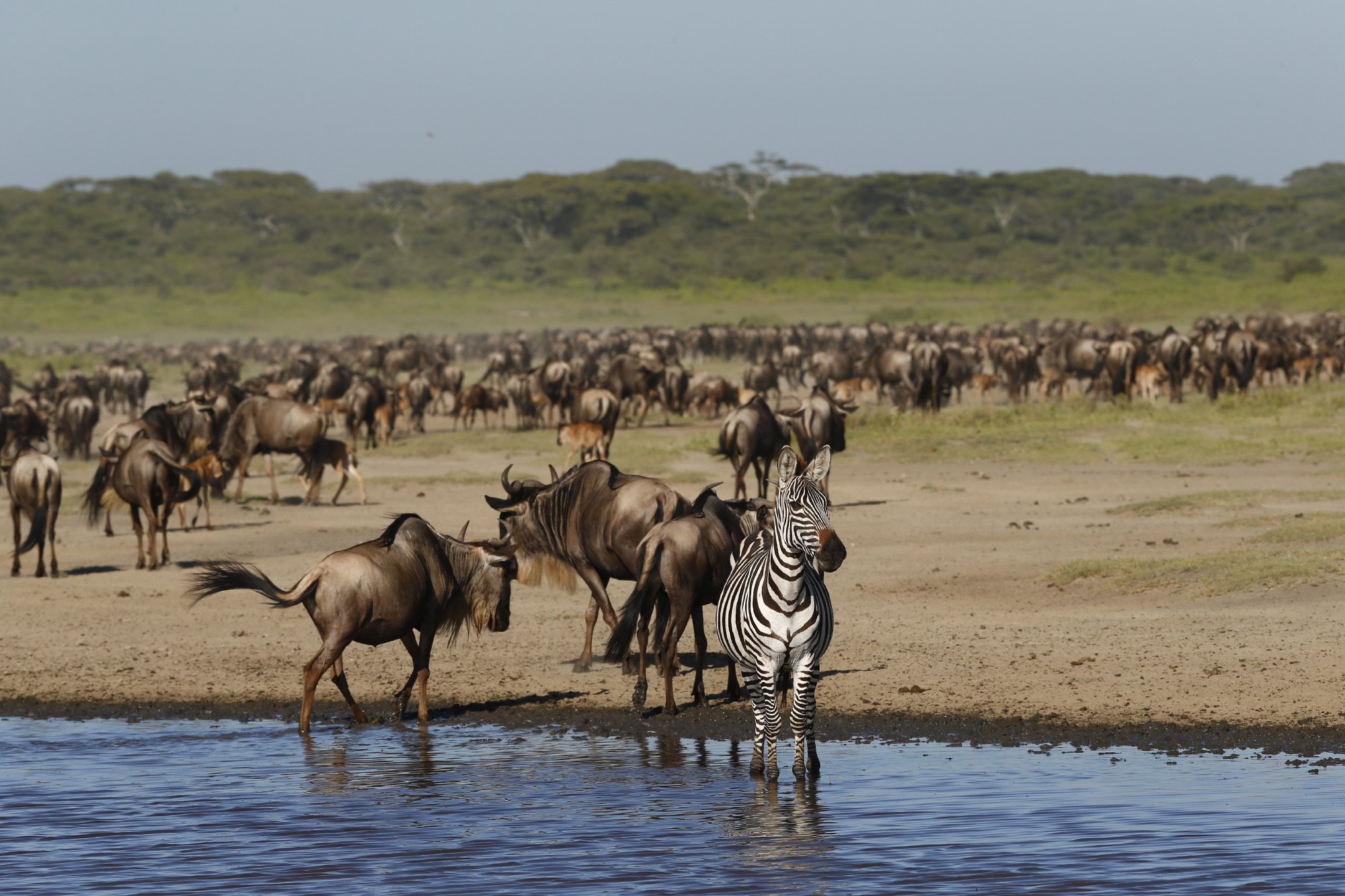
The Serengeti, the land that runs forever...
OVERVIEW
Off the beaten path, away from crowds and engines, you explore Africa in the shadows of the snowy peaks of Mt Kilimanjaro, encounter wildlife, raw and genuine tribes, the true and traditional mobile safari, where you cover great distances on the back of a horse.
The thrill of galloping across the Serengeti plains, surrounded by thousands of wildebeest, the greatest migration on earth. In contact with rare elements of grace, beauty, spirit and freedom.
Let’s Ride!
HIGHLIGHTS
Sporty riding surrounded by some of the highest denisty of wildlife in the world
One night at very comfortable safari lodge
Traditional mobile tented camp
Museum visits
Enjoy sundowners and campfires
OVERVIEW
FAST FACTS
8 Nights / 7 Days
Cost: From US$9,685 pp sharing, Single person supplement: €70 per night.
Operator: Kaskazi Horse Safaris
Where: Kilimanjaro Airport, Tanzania
When: Feb
Riding level: Advanced, you must be able to control your horse cantering and galloping in open spaces.
Riders: 4 - 10 riders
Weight limit: Maximum of 85kg / 187lbs
Time in the saddle: 4 -6 hours a day
HORSES
The horses are all purpose trained safari horses, with a mix of local breeds and thoroughbreds.
Close to all of them are ridden in English tack with one hand as most of them play polo. If you would prefer a stock saddle this can be arranged prior to the safari however all horses have their own tack thats fits them so if one wants a saddle a specific horse will be matched to you ahead of time.
All horses are given lots of love, care and attention, therefore resulting in their nice characters and strong personalities. They all have their own heads with different temperaments, which allows for the perfect fit to each rider.
ACCOMMODATION
Mobile Camp (7 Nights): Comfortable and spacious 4 X 4 tents with mosquito netted doors and windows to allow for ventilation but still remain insect proof. Each tent is provided with a carpet, towel rack, bedside table and water bottle, bed and cotton linen and a solar light. Outside each tent there is a veranda with chairs and a wash stand that you share with your tent partner. Each tent has its own bush toilet and bucket shower. The toilet is a traditional short drop style toilet with a nice wooden toilet seat over a metal box with open sides.
Permanent Tented Lodge (1 Night): The lodge is only thirty minute drive from Kilimanjaro International airport and Arusha Town, nestled between Mt Kilimanjaro and Mt Meru and home to zebras, wildebeests, Elands, Kudu’s, other species of gazelles and antelopes including the very shy and rare Gerenuk.
Within the estate there is a large variety of different activities to offer, such as horse riding, horse polo, golf, nature walks, yoga, spa treatments and are only a stones throw away from the famous Serengeti, Ngorongoro Crater, Zanzibar with a very convenient airstrip, only ten minutes down the road from the lodge.
GET IN TOUCH
Fill in an obligation free rider form by clicking “book now” and we will be in touch!
WHAT'S INCLUDED
Shared accommodation, all beverages are included in the mobile camp however not at the lodge, transfer back and forth from the airport (at KHS set times and departures), qualified private guide, horses and riding, flying doctor membership for each client (fly out insurance), wildlife department fees, wildlife management area fees, village fees, Internal flights to Serengeti/NCAA and back, entry fee to Olduvai Museum.
WHAT’S EXCLUDED
The price does not include international flights, travel insurance, or tips (US$25 a day recommended).
GETTING THERE
Kilimanjaro International Airport is the most convenient port of entry and exit, located just 45 minutes from Arusha Town and only 35 minutes drive from the lodge where your first night upon arrival is spent.
The airport is served from Europe by KLM/Northwest, which flies daily from Amsterdam.
Drop off and pick up times
Set arrival times: On the set arrival date, Kaskazi will pick up guests at any time at any place between Arusha Town and Kilimanjaro International Airport. In case of arrival a day or two earlier then the set arrival date, an additional transfer cost of $80 per vehicle (max 4 pax) will apply. This transfer fee applies within the region of Arusha Town and Kilimanjaro International Airport.
Set departure times: On the set departure date, Kaskazi will drop off guests within Arusha Town and Kilimanjaro International Airport.It is of highest important that no one has a flight departure before 1500PM on this day.For guests who depart later (who prefer notto wait at the airport), a day room can be arranged prior to the safari for an extra cost.
VISA + VACCINATIONS
A visa is required for entry into Tanzaniafrom most countries. The visa may be purchased at the Tanzanian port of entry but best to apply for this online prior to arrival. It is 50 USD per person($100 for US citizen). If you are flying in via Kenya, remember the transfer visa fee of 25 USD ($50 US citizen) on top of the Tanzanian visa fee of 50 USD ($100 US citizen).
Vaccinations
Everyone must make sure to have a yellow immunisation card to display upon arrival to Tanzania. Travellers arriving directly from US and not transferring through a country with risk of yellow fever are currently not required to be vaccinated for yellow fever. However immunisation against Yellow Fever is required when entering Zanzibar. Your physician may recommend certain other immunisations or Public Health Department and a current recommendation may be obtained from the Centre for Disease Control in Atlanta, Georgia(www.cdc.gov).
Protection against malaria is necessary; we recommend the malaria prophylaxis Malarone. Consult your physician to obtain these prescriptions and non-prescription drugs, as your preference may not be readily available.
WHAT TO PACK
Refer to our FAQ for what to pack on a horse riding holiday.
No hard suitcases, preferably soft waterproof material bags. The safaris takes place in hot climate, therefore we recommend cotton wear. Bring clothing you’ve ridden in before, to avoid rashes and blisters. To avoid rubbing on the same spot, bring different riding trousers.
All the clothing should be as nature coloured as possible, beige, khaki and nature green. The darker colours the better and avoid wearing white and red. Before the safari there will be possibilities to purchase Kaskazi Horse Safari t-shirts and caps fora fee of 20 USD per item.
As some of the terrain is thorny acacia forest, a pair of long or short chaps comes very handy. It is important to wear long sleeve shirts and to bring sunscreen along as the African sun is strong and can cause severe sunstroke. Sunglasses are highly recommended, not only for the sun but also for the dust, as during dry season in Tanzania, some areas become desert like. Bring insect repellent for the evenings, a head torch and a light raincoat. The rains are very hard to foresee and rather be prepared than unprepared.
You must bring your own helmet if you want to wear one.
Water bottle (long and narrow rather than short and wide)
2 x Riding trousers
2 x T-shirt /shirt while on safari (natural colored)
2 x Long sleeve shirts /jumpers for the evenings
1 x Loose comfortable trousers for the evenings
1 x Riding boots (preferably leather)•Flip-flops or sport sandals (showers, and airing feet)
1 x Belt (that you can attach items onto, small camera, binoculars, compass etc., you will find it handy and easy accessible when outriding).
Book to read
Hat/ Helmet (once again we highly recommend all riders to wear helmets, great protection for your head but also from the sun)
Chaps(great protection for the end less acacia thorns)
Light rain coat / poncho (IMPORTANT)
Scarf /bandana (for dust, coolant, sun protector)
1 pair of riding socks per day
1 pair of underwear per day - Staff traditionally do not do ladies smalls, washing powder is therefore available upon request for your convenience.
1 x pair of shorts (for travelling days, siesta times and if spending time on the beach)
MEALS
The food is of great standard with professionally trained bush chefs. Mark English, a gourmet chef from South Africa, trains and every now and then joins us out on safari. Himself or his trained chefs creates delicious and highly entertaining dishes.
Breakfast is of traditional Cowboy style, served with homemade juice and exotic African fruits.
Lunch is alfresco, enjoyed somewhere out in the wild under a nice shady tree, it may either be vehicle supported or we may carry it in our saddlebags.
Dinner is a three-course affair, with a mix of local and international cuisine, always served with newly baked bread and fresh salads and herbs.
Drinks are locally sourced and a large variety is brought along on safari.
INTERNET
An Airtel sim card has good reception in the national parks.
You can by an eSim online before you arrive here.
AVAILABILITY & PRICES
2026: US$9,685 per person based on 2 sharing accommodation for 8 days / 7 nights. Single person supplement: $70 per night
Dates:
24 Jan - 01 Feb 2026
07 - 15 March 2026
Fill in an obligation free Rider Form to book and we will get back to you with more information.
THE SERENGETI
Climate: In February, the Serengeti experiences a period of hot and dry weather. The daytime temperatures are typically in the high 80s°F (around 31°C), while nighttime temperatures can drop to the mid-60s°F (around 18°C). The humidity levels are generally low, making the heat more bearable. February is also part of the short dry season in the Serengeti, which means that rainfall is minimal, and the grasslands are beginning to dry out. Despite the dry conditions, the wildlife in the Serengeti is still abundant and active, with large herds of wildebeest and zebra gathering around water sources. Visitors to the Serengeti in February can expect hot and sunny weather, with spectacular wildlife sightings amidst the stunning landscapes of the Serengeti ecosystem.
Time Zone: GMT+3
Tanzania lies just south of the equator and on the whole enjoys a tropical climate.There are two rainy seasons, the short and the long rains. The long rains called Masika fall from mid-march to May, and the shorter rains called Mvuli fall from November to mid-January. The cooler climate is during the dry season and lasts from May to October.
Currency: The official currency of Tanzania is the Tanzanian shilling (TZS), which is denoted by the symbol "TSh". The shilling is divided into 100 smaller units called cents. Banknotes are available in denominations of 500, 1,000, 2,000, 5,000, and 10,000 shillings, while coins are available in denominations of 10, 20, 50, 100, and 200 shillings. It is recommended that visitors to Tanzania exchange their foreign currency at authorized exchange bureaus or banks, as they offer better exchange rates than hotels or airports. Major credit cards, such as Visa and Mastercard, are accepted at some hotels, restaurants, and shops in larger cities, but it is always advisable to carry some cash, especially when traveling to more remote areas.
YOUR ITINERARY
Please note that itineraries are subject to weather and your guide may change the itinerary if needs must with your safety in mind.
-
Arrive Kilimanjaro International Airport where you will be met and transferred around 30 minutes to the lodge for the first night, a comfortable lodge situated beautifully on a golf, polo and wildlife estate. Meet up with the rest of the group, followed by sundowner and dinner. If there is a polo game on, sundowner will be at the polo club house.
No Riding Today
-
After breakfast we drive for ten minutes down the road to catch a late morning flight to Ndutu airstrip in the southern Serengeti.
After the flight, depending on where you fly in, anything between 2-4 hours drive, depending on routing (you may be flown over the Ngorongoro Crater, Lake Manyara or Tarangire National Park, a wonderful opportunity to see these iconic sites from the air), you will be met by a safari vehicle at Ndutu.
A short wait whilst you are checked-in at the Ngorongoro Conservation area registration post, then set off driving, past impressive rocky outcrops known as “kopjes , river courses and across the Serengeti’s famous ‘short grass plains’. Prime grazing area for migrating wildebeest during the early months of the year, with luck (always dependant on the weather!) the plains may be thick with wildebeest which arrive in their thousands after the rains to make the most of the fresh grass.
The plains are also the wildebeests’ favoured birthing spot - it is one of nature’s miracles that females delay giving birth until the rains and grass arrive in an effort to ensure their newly born young get the best start in life, a chance to build their strength on lush new grass before setting off on the long march north to Kenya’s Mara plains.
About 2- 4 hours in all, you eventually arrive at the spot chosen for the first camp in the shade of a lovely flat topped acacia. Meet the team of support staff, settle into your tents and a welcome lunch in the shade of the mess tent. Then, a short siesta, before meeting the horses and their grooms, and time allowing, an evening ride to try them.
Return to camp at sun set for hot showers, drinks by the campfire and your first dinner together in the bush, before tomorrow when the adventure really starts!
(B, L, D)
-
Five more days to explore, riding across the open plains, into grassy valleys dotted with picturesque granite outcrops, swathes of whistling thorn and typically East African flat toped acacia trees.
The route and arrangements each day will vary with the weather and movement of game but your guide will aim to ride to at least one or two more camps so you can discover new areas.
On one of the afternoons or mornings the horses will be given a rest and you jump into the vehicles to visit Olduvai Museum, one of the most important paleoanthropological sites in the world.
The museum includes fossils and artifacts of our human ancestors and skeletons of many extinct animals who shared their world. Throughout the safari we will most definitely cross this gorge ‘Cradle of human kind” on one or more occasions on horseback.
The days start early with tea or coffee served at your tent, ride out for 3-4 hours of riding, meet the back-up crew for an al- fresco lunch in the bush and time to rest in the heat of the day, before heading off again, aiming to reach the new camp by tea time.
Set up ahead by the back-up, tonight’s camp might be spectacularly situated in the middle of the vast open plains, where, at peak migration time, the air will be filled with the braying and mesmerizing grunts of wildebeest.
Each day you will be welcomed with a cup of tea or a cold beer when you arrive in camp, followed by hot showers & dinner, listening to the sounds of the bush.
(B,L,D)
-
At one point during the safari (weather allowing) you will spend the night in a lightweight fly camp, sleeping under mosquito nets.
This morning you jump into the vehicles (there will be a game drive with a picnic lunch on route, crossing the short grass plains and looking out for cats such as cheetah, lion and leopard which thrive here, as well as elephant and the flamingo which gather on the area’s soda lakes.
Later in the afternoon you will reach the fly camp in time for sundowners followed by dinner under the stars.
(B, L, D every day)
-
An early wake-up call to say farewell to the horses and crew. The drive this morning will be up the Ngorongoro highlands and breakfast will be on route overlooking the world famous Ngorongoro Crater.
After checking out at the gate you head to the African galleria, a great place to buy anything from arts, tanzanite or just a small Tanzanian gift. Shortly after you head to the Manyara Airstrip followed by a 40 minutes flight back to the estate where lunch will be served.
There will be showers available to share however if you like your own dayroom please let us know and we will book this in advanced.
Thereafter vehicle transfer back to Kilimanjaro International Airport for onward flights.
(B, L)
LOCATION
CLIMATE
AVAILABILITY & PRICES
2026: US$9,685 per person based on 2 sharing accommodation for 8 days / 7 nights. Single person supplement: $70 per night
Dates:
24 Jan - 01 Feb 2026
07 - 15 March 2026
Fill in an obligation free Rider Form to book and we will get back to you with more information.
HOW TO BOOK
+ Submit an obligation free Rider Form
+ We will get in touch with availability
+ You pay your 25% deposit now with the balance due 60 days before the ride












































